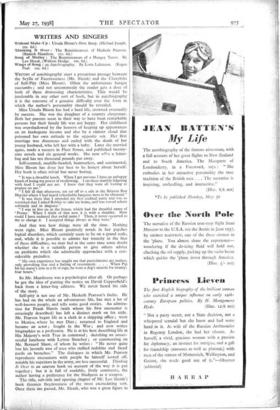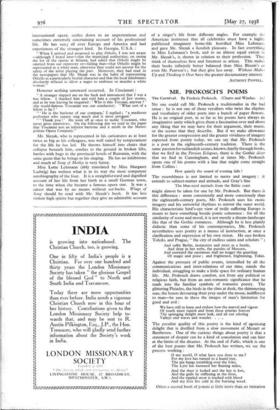WRITERS AND SINGERS
Song of Motley : The Reminiscences of a Hungry Tenor. By Leo Slezak. (William Hodge. los. 6d.) Wings of Song : an Autobiography. By Lotte Lehmann. (Kegan Paul. ios. 6d.)
WRITERS of autobiography steer a precarious passage between the Scylla of Facetiousness (Mr. Slezak) and the Charybdis of Self-Pity (Miss Bloom). Often the unfortunate barque
succumbs ; and not uncommonly the reader gets a dose of both of these distressing characteristics. This would be intolerable in any other sort of book, but in autobiography it is the outcome of a genuine difficulty over the form in which the author's personality should be revealed.
Miss Ursula Bloom has had a hard life, crowned eventually by success. She was the daughter of a country clergyman. Both her parents seem in their way to have been remarkable persons but their family life was not happy. Her childhood was overshadowed by the horrors of keeping up appearances on an inadequate income and also by a sinister cloud that poisoned her own attitude to the opposite sex. Her first marriage was disastrous and ended with the death of her young husband, who left her with a baby. Later she married again, made a success in Fleet Street, and published twenty- nine novels and six general works. She now edits a letter- bag and has ten thousand pounds put away.
Self-centred, muddle-headed, humourless, and sentimental, Miss Bloom has done her best to be honest about herself.
Her book is often trivial but never boring.
"It was a dreadful lunch. When I get nervous I have an unhappy knack of losing my power of swallowing. I sat there dumbly fidgeting with food I could not eat. I knew that they were all waiting to pounce on me."
"I felt ill that afternoon, yet set off to a sale at the Brixton Bon Marche where I had heard remarkable bargains were to be obtained."
"It was there that I attended my first cocktail party and was so wretched that I asked Robbie to take me home, and was rowed ashore solemnly and in disgrace."
"I was to live on in the house, which had the dreadful name of 'Poona.' When I think of that now it is with a shudder. How could I have endured that awful name ? Then, it never occurred to me to change it. I accepted things always as they were."
And that was how things were all the time. Nothing went right. Miss Bloom positively revels in her psycho- logical disorders, which certainly seem to he on a grand scale, and, while it is possible to admire her tenacity in the face of these difficulties, we may feel at the same time some doubt whether she is a suitable person to give others advice on problems which she admittedly approaches with a con- siderable prejudice.
"My own experience has taught me that punishments are useless, only provoking fear and a feeling of resentment. . . . When Pip bit his nurse's arm in a fit of rage, he wore a dog's muzzle for twenty- four hours."
So Mr. Murdstone was a psychologist after all. Or perhaps he got the idea of putting the notice on David Copperfield's
back from a letter-bag editress. We never heard his side of the story.
Self-pity is not one of Mr. Hesketh Pearson's faults. He has had on the whole an adventurous life, has met a lot of well-known people, and tells some good stories. An admira- tion for Frank Harris (with whom his first encounter is amusingly described) has left a distinct mark on his style.
Mr. Pearson began life as a clerk in a shipping office ; went to Mexico, where he met Diaz ; returned to England and became an actor ; fought in the War ; and now writes biographies as a profession. He is at his best describing life at His Majesty's with Tree in command ; sketching an unsuc- cessful luncheon with Lytton Strachey ; or commenting on Mr.' Bernard Shaw, of whom he writes : "He never quite lost his juvenile awe of men who stalked redskins and faced
perils on bronchos." The dialogues in which Mr. Pearson.
reproduces 'encounters with people he himself scored off, notably his superiors in the army, are less successful. Thinking It Over is an uneven book on account of the way it is put together ; but it is full of readable, lively comments, the author having a preference for the bludgeon as a' weapon. . The tide, sub-title and opening chapter of Mr. Leo Slezak's book threaten ficetiousiieSs of the most excruciating sort. Once theie are passed, Mr. Slezak, who was a great figure in
international opera, settles down to an unpretentious and sometimes extremely entertaining account of his professional life. He has suns all over Europe and America and had experiences of the strangest kind. In Georgia, U.S.A. :
"When I arrived and proposed to play Othello, I was not aware —although I heard later—that the municipal authorities, on seeing the list of the operas at Atlanta, had asked that Othello might be omitted from our repertory or—failing that—that Othello might be represented as a white man, otherwise they could not answer for the safety of the artist playing the part. Moreover, they had read in the newspapers that Mr. Slezak was in the habit of representing Othello as a particularly bestial character and that the local inhabitants absolutely refused to allow a negro to embrace or murder a white woman.'
However nothing untoward occurred. In Cincinnati :
"A stranger slapped me on the back and announced that I was a fine fellow. I thanked him and told him a couple of Jew stories, and as he was leaving he enquired : 'Who is this Toscani, anyway ? ' (the world-famous Toscanini was our conductor). 'What sort of a fellow is he ? '
" ' He is the baritone of our company,' I replied ; e a mediocre performer who cannot sing much and is most arrogant.' " ' Thank you!' He went off at once to tackle Toscanini, who never gives interviews. On the following day we read in the paper that Toscanini was an inferior baritone and a misfit in the Metro- politan Opera Company."
Mr. Slezak, who is represented in his caricatures as at least twice as big as his colleagues, was well suited by temperament for the life he has led. He throws himself into chairs that collapse beneath him, crashes to the ground in broken lifts, battles with bugs in the provincial hotels of Rumania, with the same gusto that he brings to his singing. He has no inhibitions and much of Song of Motley is very funny.
Miss Lotte Lehmann (ably translated by Miss Margaret Ludwig) has written what is in its way the most competent autobiography of the four. It is a straightforward and dignified account of her life from her birth in a small German town, to the time when she became a famous opera star. It was a career that was by no means without set-backs. Wings of Song should be read with Mr. Slezak's book. It has less violent high spirits but together they give an admirable account of a singer's life from different angles. For example the American insistence that all celebrities must have a highly publicised imaginary home-life horrified Miss Lehmann and gave Mr. Slezak a fiendish pleasure. In fact everything in Miss Lehmann's book, and to an almost equal extent in Mr. Slezak's, is shown in relation to their profession. They think of themselves first and foremost as artists. This makes their books infinitely better balanced than Miss Bloom's or even Mr. Pearson's ; but they give less away. Without Make. Up and Thinking it Over have the greater documentary interest.
ANTHONY POWELL.



















































 Previous page
Previous page